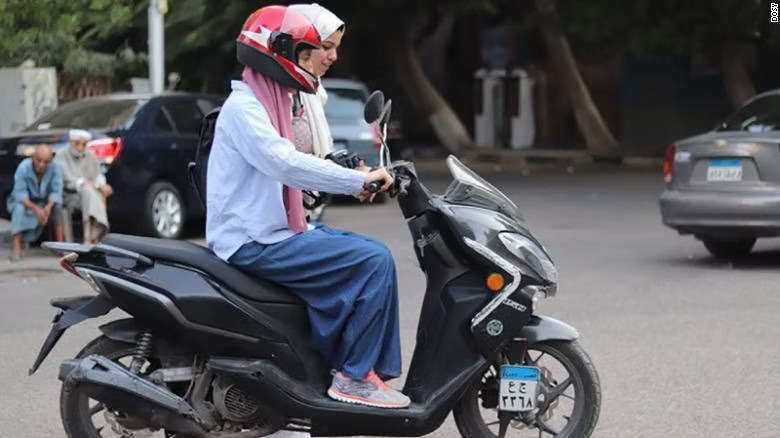“Mobility is a basic freedom — we’re just helping women access it,” says Nouran Farouk, co-founder of Dosy Bikes.
When Farouk speaks, her words are steady but charged with purpose. She is not just describing a start-up; she is describing a quiet act of rebellion — one that began with a scooter and a question no one seemed to ask out loud: why should not women ride?
In 2019, Farouk and her sister, Menna, launched Dosy, Egypt’s first women-led mobility platform dedicated to training, ride-hailing, and motorbike buying/selling. What began as a simple effort to teach women to ride has grown into a movement, challenging traffic, tradition, and the long-held notion that streets belong to men.
From Medicine to Mobility
Before Dosy, Farouk’s life was in white coats, not helmets. “I graduated from medical school and completed my master’s in Internal Medicine at Ain Shams University,” she recalls. “Dosy began during my residency year. My sister, who had prior experience working in start-ups, suggested it. She said, “‘Why don’t we start something like this?’ and we just went for it.”
At the time, Farouk knew nothing about entrepreneurship. “I was used to structure; the hierarchy of hospitals, the certainty of medicine,” she tells Egyptian Streets. “But, when we started Dosy, people were unusually excited. Within six months, someone from South Africa reached out to write about us. It was the first sign we were onto something real.”
Between hospital shifts and business calls, she learned how to pitch, recruit, and lead. “I stayed in public health for a while, but eventually shifted to private practice so I could have flexible hours to work on Dosy.”
Her medical background still informs how she thinks. “Health and mobility are linked,” she explains. “The ability to move freely affects physical and mental well-being. In a way, Dosy is preventative medicine.”
The Spark: When a Need Becomes an Idea
The spark was personal.
“We wanted to learn how to ride scooters but couldn’t find a female instructor,” Farouk explains. “That was the starting point. I realised that if I couldn’t find one in Cairo, thousands of other women probably couldn’t either.”
What began as a gap in the market soon revealed deeper roots; the unwritten rule that women’s movement must be limited, especially in public spaces. “Over time, we discovered the biggest barrier wasn’t a lack of instructors; it was the mindset that women shouldn’t be driving scooters or bikes,” she says.
In 2019, seeing a woman on a scooter in Cairo was almost shocking. “Now I see girls riding all the time,” Farouk says, smiling. “It still surprises me, in a good way. I like to think we played a small role in that.”
The Platform: More Than Two Wheels
Today, Dosy functions as a complete mobility ecosystem.
“We offer four main services,” Farouk says, counting them off. “Training, a ride-hailing service, a marketplace for selling and renting scooters and bikes, and a few complementary classes — roller-skating and self-defence.”
The e-commerce feature allows anyone with a scooter or bike, not only Dosy instructors, to list it for sale or rent through the website or app. “That was our first step toward scale,” she explains. “We wanted the platform to connect women — whether to learn, ride, or buy.”
Then came ride-hailing. “It started purely from user demand,” she says. “Women wanted safety, comfort, and affordability. So, we built a service that gives them that. Most apps focus on speed and coverage. Ours focuses on trust.”
She pauses, then adds, “We didn’t even market it much. It spread by word of mouth. That’s how you know there’s a real need.”
The Classroom: Women Teaching Women
Training remains Dosy’s backbone. “When we started, we just posted on social media looking for female scooter instructors,” Farouk remembers. “Some girls already knew how to ride, so we interviewed them, trained them, and supervised their first classes.”
That process evolved into a system. “Now, women who finish their training with us can become instructors themselves,” she says. “We focus on personality as much as skill. Teaching someone to ride is personal. You need trust.”
Each session is monitored for quality and safety. “It’s not just about technique,” she adds. “For some women, getting on a scooter means overcoming their fears. And I am not just referring to driving or traffic, I’m talking about their fears of judgment and failure. You have to create an environment where she feels capable.”
Pricing, Perception, and Practicality
Farouk is candid about one of Dosy’s biggest criticisms: pricing.
“People sometimes say our prices are high,” she acknowledges. “But, costs have changed. When we began, scooter lessons were for EGP 800 [USD 16]. Now, fuel, maintenance, and transport for instructors have gone up. Most instructors live in central Cairo, so traveling to new areas costs more. We adjust prices accordingly.”
Dosy’s packages now range from EGP 2,400 to EGP 6,000 (USD 49 – USD 122, respectively), depending on duration and location. “We’re working on more flexible plans through the app,” she says. “But, development takes time.”
The company’s audience, she admits, still skews toward middle-income women living in compounds. “We started there because it’s safer and easier to train; the infrastructure and traffic in Downtown Cairo is not a safe teaching environment,” she says. “ The ultimate goal, however, is to reach everyone, everywhere.”
From Service to Sisterhood
Over time, Dosy’s community has become its greatest strength. “Many of our instructors were once students,” Farouk says proudly. “Some even became delivery riders. It’s like a cycle — no pun intended — of women supporting women.”
She often receives messages from trainees sharing milestones: first solo rides, first commutes to work, even first trips outside their neighbourhoods. “That’s when I realise how emotional this work is,” she says. “We’re not just teaching women to ride; we’re helping them claim space.”
Even Dosy’s name reflects that spirit. “It comes from the Arabic word ‘dous’, meaning ‘press on’ or ‘go ahead,’” she explains. “It’s our message to every woman: just go.”
However, Farouk does not romanticise the backlash. “At first, the comments online were awful,” she admits. “‘Go back to the kitchen,’ ‘This is un-Islamic,’ ‘You’re encouraging bad behaviour.’ It was endless.”
Instead of ignoring it, Dosy engaged. “We replied, explained, and shared stories,” she says. “Over time, those voices quieted down. Now, most feedback is supportive.”
Public perception, she believes, is shifting faster than expected. “The more people see women riding, the more normal it becomes,” she says. “I see young girls watching us in the street, smiling, pointing, asking questions. That’s how change starts.”
However, infrastructure still lags behind culture. “Older Cairo’s streets aren’t built for scooters,” she says. “There are no lanes, no clear rules. That’s why we focus on compounds and safer areas first.”
Growing with Purpose
Despite its organic success, Dosy’s growth remains deliberately cautious. “We’ve been approached by investors,” Farouk says, “We’re selective. We rely mostly on grants and partnerships for now. Once revenue stabilises, we’ll consider outside investment, but we don’t want to compromise our mission.”
Profit, she insists, is not the priority. “It’s about sustainability. Quick money can destroy a purpose-driven start-up if it comes with pressure to grow at any cost.”
Instead, Dosy’s expansion plans focus on strengthening technology and reaching new cities. “We’re working on app updates based on user feedback,” she says. “The vision is to make Dosy a national mobility companion for women.”
Her ultimate ambition is regional. “Why not expand across the Middle East? The challenges are similar: culture, safety, and infrastructure. The solution we’re building here could inspire others.”
Policy, Infrastructure, and the Law
“If I could change one law, it would be transportation policy,” Farouk says instantly. “Public transport in Egypt is chaotic. There are no schedules, no structure, no safety.”
For her, reforming transport would benefit everyone, not just women. “If buses and microbuses were organised and safe, fewer people would need private cars. Women would move more freely. It would reduce traffic, emissions, and stress. It’s a national issue, not just women-related.”
Still, Farouk does not wait for policy to change. “We do what we can from the ground up,” she says. “If the system won’t make space for women, we’ll make our own.”
Six years into its journey, Dosy is still defining what sustainable success means. Its founders balance ambition with realism, a rarity in Egypt’s volatile start-up scene.
“We’re growing slowly, but intentionally,” Farouk says. “I don’t want to look back and see we lost our essence chasing numbers. Every ride we teach, every woman who joins, is a win,” she says. “That’s how change happens: small, steady, visible.”
Asked what keeps her motivated, Farouk does not hesitate. “Every time I see a girl ride past me on a scooter, I feel something shift,” she says. “When we started, it felt impossible. Now it feels inevitable.”
Dosy may have begun with scooters, but its true engine is social momentum. “We started because we couldn’t find a female instructor,” Farouk reflects. “Now we have dozens of women teaching others, hundreds riding daily, and a community that grows by itself.”
She glances at the road ahead — literally and figuratively. “This is only the beginning,” she says. “We’re still riding against the current, but the current is starting to move with us.”







Comments (0)